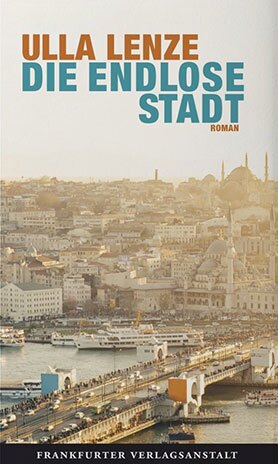Ulla Lenze
Die endlose Stadt
[The endless city]
- Frankfurter Verlagsanstalt
- Frankfurt am Main 2015
- ISBN 978-3-627-00210-7
- 317 Pages
- Publisher’s contact details
Ulla Lenze
Die endlose Stadt
[The endless city]
Sample translations
Rumblings of a world without borders. Ulla Lenze’s novel of the beauty and terror of global culture
Ulla Lenze lived in Mumbai on the invitation of the Kunststiftung NRW and the Goethe Institute, while the Cologne Cultural Office sent her to Istanbul. She has found a compelling way to conjure the literary fusion of two megacities that are worlds apart from each other, by telling her story through two female characters in whom two urban experiences, as powerful as they are disturbing, mirror and interpenetrate one another in multifarious fashion.
Holle Schulz is a visual artist who photographs cities, or to be precise: architectural ensembles that are absent, as far as possible, of people. She comes to Istanbul with a fellowship, falling in love not only with the metropolis that straddles Orient and Occident, but with Celal, owner of a kebab shop – or at least with his beautiful body and his ingenuous passion. At the same time, she feels drawn toward the rich German building contractor Christoph Wanka, who is fascinated by her work. What connects her with him is, in a sense, a reluctant intellectual resonance, for on the surface he embodies everything he despises – the unscrupulous elegance of the “new colonizers” in a world where capitalism has dissolved all borders. He uses his company’s culture budget to purchase her pictures, financing a stay in Mumbai which she abruptly breaks off, however, when she feels pressured by her benefactor.
She sublets her apartment to the German journalist Theresa, a socially-critical travel reporter, more grounded than the hypersensitive Holle, but similarly alert to the crass contradictions of life in exploding urban areas such as Istanbul and Mumbai, and to the fundamentally dubious nature of all western cultural and economic activities in these environments.
In an ingenious interplay, Ulla Lenze intercuts the two women’s perceptions and reflections, sending each on adventures that illuminate the country around them and juxtaposing the impinging reality of their everyday urban life with the cynical attitude of the gentrifiers and profiteers represented by Christoph Wanka and his omnipresent corporation.
Alongside essayistic observations that sharply define these young cosmopolitan women’s perspectives on the lands of the near and far east, a deep impression is made by the vividly sensual, densely atmospheric descriptions of street scenes, residential environments, traces of the past and scars of the present in these two rumbling megalopolises. The romantic elements lend an additional tension to the precisely-told, fast-paced novel while maintaining its artfully constructed balance.
► Extract in Al-Kaheera
Translated by Isabel Fargo Cole

By Kristina Maidt-Zinke
Kristina Maidt-Zinke is a book and music critic at the Süddeutsche Zeitung and also writes reviews for Die Zeit.
Publisher's Summary
Holle is an artist from Berlin; she takes pictures of cities, of empty spaces, to capture their hidden energy. With a fellowship program she lives in Istanbul, an achingly beautiful city she tries to understand in a new way, leaving dividing terms like Occident and Orient behind her. However she cannot keep her distance when a handsome Turkish man, Celal, seduces her with his modesty and naive talks. But it is the encounter with Christoph Wanka, whose firm not only sponsors her fellowship but also several construction projects in Mumbai, that causes her to sway. Although Wanka represents everything Holle is opposed to in her life and art, this silky and successful businessman fascinates her. When Wanka offers to finance her next project in Mumbai, Holle, in an endless trial of strength, has to bring her whole life script and concept of art into question. On the spur of the moment she flees to Istanbul, where she would love nothing better than to get lost in the labyrinthine body of the city. When the demonstrations of Gezi Park make the city stagger, it seems to be the perfect opportunity ...
The Endless City tells the story of two women in two adventurous cities, Istanbul and Mumbai, and their search for an existence in accordance with their values. An eclectic and outstanding novel about art, power and the fragile construction of identity.
(Text: Frankfurter Verlagsanstalt)
